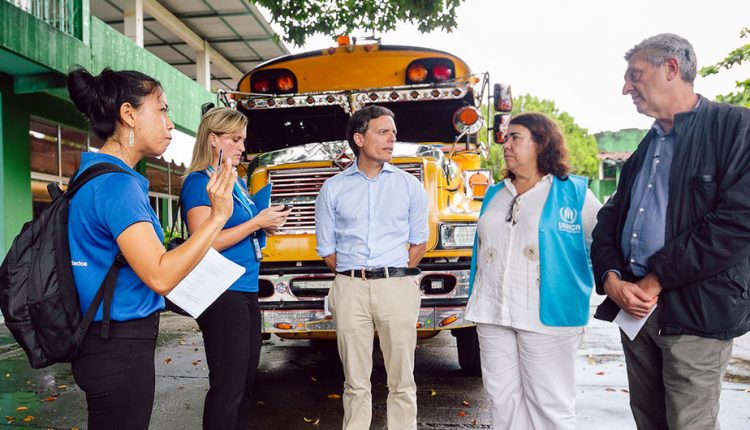Mexico: Helping refugees go into business, a ‘win-win situation’, says UNHCR’s Grandi
Through an innovative and collaborative scheme, some refugees in Mexico have started their own businesses creating what the UN refugee chief called on Wednesday “a win-win situation” for the local economy.
The programme involves Government authorities, private enterprise, civil society and UN refugee agency, UNHCR. It’s helping to fill labour shortages in some regions, while also giving refugees and their families “access to jobs, education and housing and, above all, safety and dignity”, UN High Commissioner for Refugees Filippo Grandi said, after a five-day visit to the country.
“It is an excellent model that could be replicated, not only throughout Mexico but in other parts of the world”, he added.
“I thank Mexico for providing the urgent protection that these people need,” said @RefugeesChief after hearing some of the horrifying stories asylum seekers in Mexico bring with them. https://trib.al/kN7obzS
The UNHCR chief heard stories both of hope, and despair, with the refugee crisis along the border with the United States, leaving thousands trapped in Mexican cities, for months on end, while asylum applications are processed. Last month, new US rules oblige migrants to show they have already been denied asylum in Mexico or elsewhere, before they can apply.
With applications having soared to over 48,000 in the first eight months of this year, Mr. Grandi explained that Mexico is facing increased challenges as a result of US policy changes that have led to “a significant increase in the number of individuals deciding to apply for asylum in Mexico, putting additional strain on an already overwhelmed asylum system”.
“Concerns in this regard are particularly acute along Mexico’s northern border,” he stated.
During his trip, Mr. Grandi met refugees and asylum-seekers in northern and southern parts of the country, mostly from neighbouring countries in Central America, who said that violence, abuse and persecution at the hands of criminal gangs had forced them to flee.
The High Commissioner was heartened to hear most say they had been welcomed by local communities. With the support of the local authorities, over 3,000 refugees have been relocated to four states in Mexico this year alone.
Mexico has increasing switched from a United States-bound transit country, to a end-point destination for those from Latin American countries and beyond, said UNHCR.
Southern border
During a visit to the southern state of Chiapas, which hosts almost 70 per cent of asylum seekers in Mexico, the refugee chief met people who were “physically and emotionally impacted, frightened and in need of help.”
He lauded the Government for its “efforts to protect and assist them, particularly at a time when Mexico is under growing pressure from increasingly complex mixed flows of refugees and migrants.”
Although the Mexican refugee office, COMAR, has accelerated the asylum process, he said the Government should step up its commitment to increase resources, noting that people wait months for documentation to enter the labour market and receive social services.
I would like to see a screening protocol at the border…for vulnerable cases seeking asylum — UN refugee chief
And at the southern border, the High Commissioner saw first-hand the challenges facing the Mexican immigration authorities.
While recognizing Mexico’s sovereign right to control its borders, he expressed concern over a lack of systematic safeguards and adequate protocols for screening and processing asylum seekers and the automatic detention of asylum-seekers at the border, including families with children.
“I would like to see a screening protocol at the border which at least would enable automatic access to COMAR for vulnerable cases seeking asylum, as a first step”, Mr. Grandi said.
In Tapachula, he spoke with people from Haiti, Cuba and various African countries, many of whom do not wish to apply for asylum in Mexico, but need solutions in line with the Global Compact for Safe, Orderly and Regular Migration.



